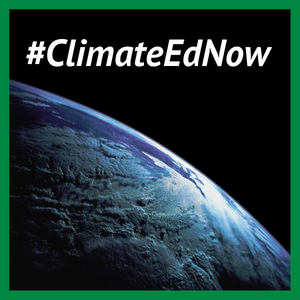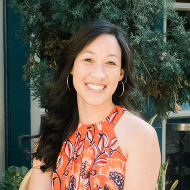 These days, my inbox is filled with emails from K–16 students who feel the urgency, anxiety, and impacts of the climate crisis. They share in great detail about what they’re hearing and seeing on social media and in the news. They express their frustrations over not knowing what to do to move the system or where to go to learn more if they don’t get the depth of knowledge they want at school. They’re overwhelmed and anxious about their future, and they feel compelled to do something. Although my responses vary from student to student, the overall message is always grounded in hope through meaningful solutions starting from wherever they are. I know that many of us recognize that young people are more than capable not only of learning but also of taking action on climate change. This important message is one that students need to hear more often, tied to opportunities to develop solutions in meaningful ways.
These days, my inbox is filled with emails from K–16 students who feel the urgency, anxiety, and impacts of the climate crisis. They share in great detail about what they’re hearing and seeing on social media and in the news. They express their frustrations over not knowing what to do to move the system or where to go to learn more if they don’t get the depth of knowledge they want at school. They’re overwhelmed and anxious about their future, and they feel compelled to do something. Although my responses vary from student to student, the overall message is always grounded in hope through meaningful solutions starting from wherever they are. I know that many of us recognize that young people are more than capable not only of learning but also of taking action on climate change. This important message is one that students need to hear more often, tied to opportunities to develop solutions in meaningful ways.
My work with educators allows me to support them in teaching to 21st-century concerns of climate and environmental literacy, justice, and action. Much of the current curriculum focuses on explaining climate and environmental science, but often stops short of addressing climate and environmental justice. Students need opportunities to explore the social and ethical dimensions of science issues — in fact, doing so supports their development as scientifically literate citizens who will one day vote on public policies. These are the very issues that students care about now, and they shouldn’t have to choose between content or context. The science content should help them to improve or enhance their lived realities in culturally relevant and meaningful ways.
Educated at schools in the inner cities of Los Angeles, I never learned about the disproportionate environmental inequities in my own community. I grew up next to the 110 freeway, where people suffer from higher asthma rates, and then moved to a neighboring city next to the train station and downwind from the local refinery — the “sacrificial zone.” When I went back to teach in my own community, I was devastated to learn that these environmental inequities would be further exacerbated by climate change. For me, this was a call to action. Upon learning more about climate and environmental science and the inequitable and unjust systems in place that disproportionately affect marginalized communities, I was motivated to activate the agency of my affected students. Rather than shy away from the ethical dimensions of the science topic, I leaned harder into them to engage students in issues they wanted to learn more and do something about. I didn’t have all the answers for them, but I pushed them to critically analyze the information they were exposed to and to develop diverse solutions as we dove deeper together. The lessons I learned from their bravery, kindness, and leadership continue to fuel my drive and passion in this field.

 These days, my inbox is filled with emails from K–16 students who feel the urgency, anxiety, and impacts of the climate crisis. They share in great detail about what they’re hearing and seeing on social media and in the news. They express their frustrations over not knowing what to do to move the system or where to go to learn more if they don’t get the depth of knowledge they want at school. They’re overwhelmed and anxious about their future, and they feel compelled to do something. Although my responses vary from student to student, the overall message is always grounded in hope through meaningful solutions starting from wherever they are. I know that many of us recognize that young people are more than capable not only of learning but also of taking action on climate change. This important message is one that students need to hear more often, tied to opportunities to develop solutions in meaningful ways.
These days, my inbox is filled with emails from K–16 students who feel the urgency, anxiety, and impacts of the climate crisis. They share in great detail about what they’re hearing and seeing on social media and in the news. They express their frustrations over not knowing what to do to move the system or where to go to learn more if they don’t get the depth of knowledge they want at school. They’re overwhelmed and anxious about their future, and they feel compelled to do something. Although my responses vary from student to student, the overall message is always grounded in hope through meaningful solutions starting from wherever they are. I know that many of us recognize that young people are more than capable not only of learning but also of taking action on climate change. This important message is one that students need to hear more often, tied to opportunities to develop solutions in meaningful ways.